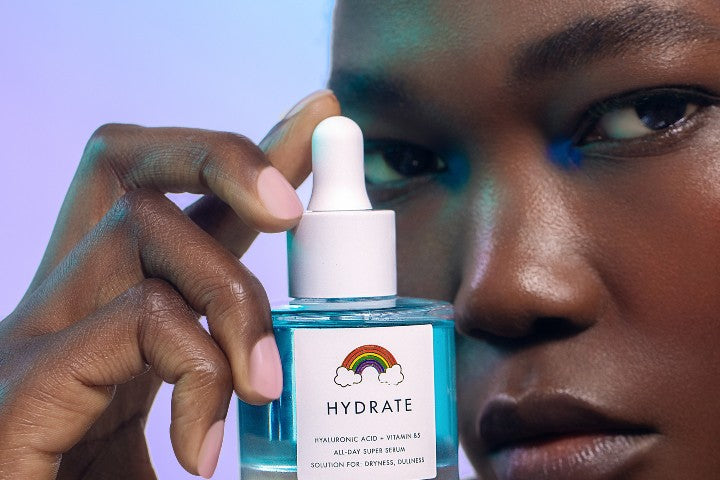Dry Skin? Here's How to Deal With it

Dry skin is the result of skin that doesn't retain adequate moisture. This can happen for a number of reasons, including the use of harsh soaps, taking hot showers, and certain medical conditions. For some people, dry, itchy skin may even stem from living in a colder climate where the air is cold and dry.
Whatever the reason behind your dryness, here's how you can fix dry skin.
Cleanse Wisely
As important as moisturizing is for diminishing dryness, it's harder to hydrate skin if you are cleansing with a dehydrating product. You want a skin cleanser that's going to effectively remove dirt, oil, and makeup without stripping your skin of moisture.
That starts with seeking out a sulfate-free facial cleanser. If you take a look at the ingredients list on your average bottle of cleanser, you'll no doubt see either sodium lauryl sulfate, sodium laureth sulfate, or ammonium laureth sulfate listed on it. These are all forms of sulfates that strips the skin of oil and water after washing.
The skin needs a certain amount of oil to keep the skin barrier strong and protected.
"Damage or remove those oils, and the skin barrier is more susceptible to breaking and allowing environmental insults, like UV rays or pollution, in," says dermatologist Carl Thornfeldt, MD.
Always use a cleanser without these moisture sucking ingredients to keep your skin healthy, hydrated, and protected. Look for a formula that contains hydrating ingredients like hyaluronic acid, coconut oil, glycerin, or vitamin E for plump, dewy skin.
Moisturize Immediately After Washing
After washing your face, moisturize right away using a nourishing face cream or serum.
The moment you finish washing your face, your skin starts to dehydrate, which is why it's essential to apply a moisture-loaded lotion as soon as possible to help lock in water and keep the skin hydrated for several hours, or more.
For best results, apply your moisturizing cream to slightly damp skin.
Wash in Lukewarm Water
Washing in hot water is never a good idea, regardless of your skin type. However, it's an especially bad idea if you have dry skin, sensitive skin, or a skin condition like eczema or psoriasis, as hot water can trigger a flareup, leaving you with a dry, flaky complexion.
This rule applies both to your face and body. Start taking cooler showers to prevent your skin from drying out. The cooler, the better. Hot water will only ever leave your skin dry.
Slather on a Hydrating Oil Serum
Since your primary goal is skin hydration, it makes sense to incorporate a moisturizing skin serum into your daily skincare routine.
According to dermatologists, a healthy skin barrier comprises of free fatty acids, cholesterol, and ceramides. For a skincare product to quench skin's thirst, it's important to look for a formula that restores the skin barrier. The best product to do that with is a product made with hyaluronic acid.
Restore your skin's moisture levels with Rainbow's Hydrate Serum. It's made with a nourishing blend of hyaluronic acid and vitamin B5 which join forces to diminish dullness and dryness. They also aid in preventing fine lines and hyperpigmentation.
Avoid Over-Exfoliating
As fundamental as exfoliation is for removing dirt and dead skin cells from the skin's surface, over-exfoliating can damage your skin's moisture barrier, leading to dryness, flaking, and irritation.
Experts say any form of exfoliation can weaken the protective skin barrier. It can also trigger an inflammatory response in the skin. Skin barrier damage and long-term inflammation can cause a myriad of skin concerns such as dryness, sensitivity, and even skin conditions like atopic dermatitis.
Still, that doesn't mean you should cease exfoliating altogether. It’s still important to exfoliate to remove dead skin and enable products to properly absorb. If you have chronically dry skin, stick to chemical exfoliants (aka, acids like glycolic and lactic acid) of low concentrations to prevent experience that damaging response.
Try Rainbow's Glow Mask, which is formulated with glycolic acid and bakuchiol, to gently buff away dull, dry skin.
Plug in a Humidifier
As effective as lotions and creams are for diminishing dryness, adding moisture to the air may also help control the situation. In the wintertime especially, the air becomes dry, leaving your skin vulnerable to dehydration. If the temperatures are dropping or you live in a dry climate, try plugging in your humidifier to add moisture into the air and keep moisture in your skin.
Set it to around 60% to replenish the top layer of the skin and prevent those skin-nourishing natural oils from dissolving.
Put on Petroleum Jelly
To quickly relieve dry skin, consider applying petroleum jelly to affected areas. Petroleum jelly is an emollient that forms a protective layer on the top of the skin that seals water in the skin.
For the best results, apply petroleum jelly when your skin is damp.
Wear Gloves When You Do Dishes
Reverting back to the topic of hot water drying out the skin, wearing gloves when you wash the dishes can significantly help prevent dryness. After all, dry skin doesn't only affect the face. It affects the rest of your body, including your hands. Wearing gloves also helps protect the skin from harsh detergents which are known for leaving skin parched.
Always Wear Sunscreen
Protecting your skin from the sun can help combat fine lines, wrinkles, dark spots, and dryness.
"Wearing sunscreen every single day is the most important thing you can do for your skin to keep it healthy and glowing," says Shani Darden, an L.A.-based expert celebrity esthetician. "Even if you’re inside all day, UV light can still pass through your windows, so it’s essential to keep your skin protected."
Choose a broad-spectrum sunscreen with an SPF of at least 30.
These are just a few ways to deal with dry skin. We also recommend steering clear of retinol for the time being, as this anti-aging elixir may only worsen symptoms. Consult your dermatologist or healthcare provider if your dryness cannot be treated with over-the-counter products or home remedies. You may have a skin condition that requires prescription treatments.
